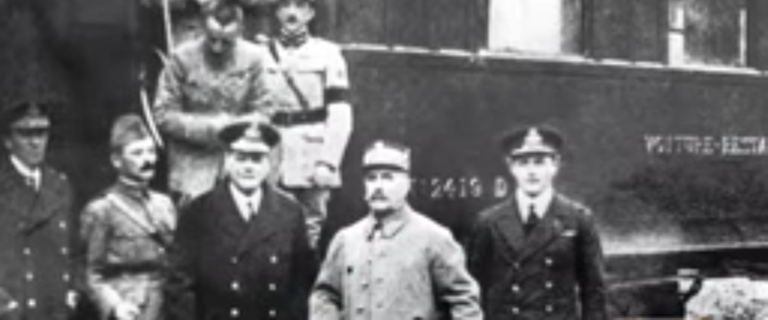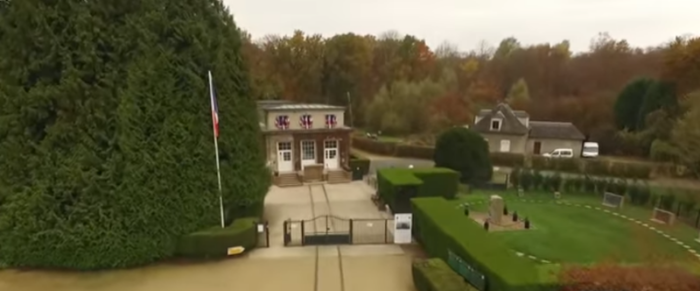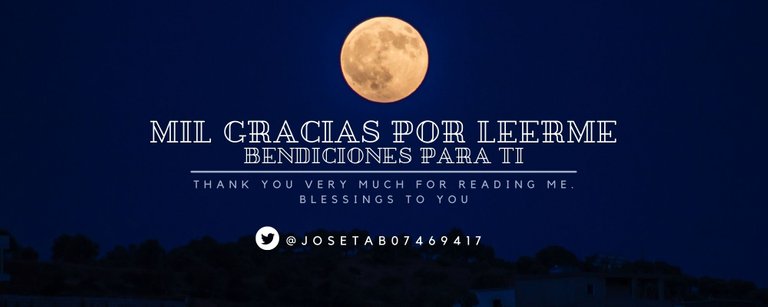

UN MINUTO PARA LA PAZ
Dos niños hermanos se escaparon de casa con el pretexto de jugar, andar en bicicleta por la pradera y recorrer los caminos de tierra. Era la Francia de 1918 convulsionada por la guerra. Aunque toda Francia estaba devastada, aquella pequeña región hubo de permanecer casi aislada de los hechos y las noticias de la guerra.
Aquellos paisajes llenos de viñedos no habían sucumbido a los rigores de la guerra. Las tareas rutinarias de las cosechas proseguían bajo una tensa calma, cargada de rumores de malas noticias del frente. Los adultos se encargaban de que no llegaran a los niños.
Los traviesos tumbaban los aparatos arrumados en el depósito del rancho, para aprovechar el repentino permiso de volver a usar las bicicletas. Las telas de arañas cubrían todos los aparatos allí apilados. Buscaron trapos y cepillos para limpiarlos. El óxido hizo mella en todos los dispositivos de metálicos.
Salieron dando carreras desde las mismas puertas del almacén. La carrera fue larga hasta las alambradas principales que dividían la parcela de la carretera pública. Iban recordando malabares que acostumbraba hacer cuando llegaban hasta el pozo. Era un lugar más alejado, casi llegando al río Compiegne. Pero esta vez no llegarían hasta allá, ya que los permisos de sus padres fueron concedidos solo hasta la carretera principal.
Fransuá se detuvo primero un poco cansado por la cerrera, un poco más adelante lo hizo Antoné. Tratando de que su hermano lo alcanzara, pero no fue así y tuvo que devolverse. Lo saludó al llegar con un golpe sobre la gorra, y le dijo: “Toma esto por lento…” Se cruzaron unas miradas cómplices, alinearon las bicicletas, y dieron rienda suelta a los pedales, para llegar hasta el pozo de una solo tirada. Sitio que le fue prohibido por sus padres.
Cuando llegaron a la orilla del pozo, tiraron las bicicletas a un lado, saltaron sobre ellas y se metieron al pozo casi sin pensarlo. Nadaron por un largo rato. El placer se confundió con la naturaleza, regocijando las almas de aquellos niños que tenían algunos años sin el disfrute de nadar.
Cuando el cansancio los sobrepaso, y sus dedos comenzaron a entumecerse, decidieron salir del agua. Al final del camino se veía la casa abandonada. Lanzaron lajas de piedra sobre la superficie del agua a ver quién llegaba más lejos. Fransuá que era el mayor gano la apuesta, la cual se pagaría dejándose de primero por sus padres, por romper la promesa de no llegar hasta el pozo. Antoné se sintió inconforme, y trato de pelear con su hermano. Se fueron a los puños, luego rieron tumbados en la tierra, mirando de frente la casa antigua. Volvieron a entrecruzar aquella mirada cómplice, y se lanzaron a explorar la casa. Esta acción nunca la habían hecho, porque le habían hablado que salía un muerto en los cuartos de la casa. Rompieron el miedo que los había acompañado toda la niñez, y salieron corriendo hasta la entrada dela casa.
Las ruinas habían cobrado parte de la casa, aunque todavía se mantenía en pie. Los cascarones de madera de la escalera todavía servían. Subieron por allí hasta la parte superior, por donde se veían las líneas del tren. Aquel paisaje le era extraño, nunca habían visto las líneas del tren tan cerca. Sus padres los mantenían siempre alejados de las líneas, debido a arroyamientos sufridos por muchos niños a lo largo de la vía.
Fransuá observó la llegada de camiones de guerra a un costado de la línea. Se bajaron varios soldados franceses. Más tarde llegaron otros camiones y otros soldados. Antoné quiso salir corriendo, pero Fransuá lo detuvo con el brazo y lo mando a sentarse en silencio. Le explicó entre medias voces, que todo el sitio debería estar resguardado por los soldados. En unos pocos minutos volvieron a llegar camiones con soldados, pero esta vez del otro lado de la línea férrea. Se bajaron más soldados, solo que esta vez eran soldados alemanes. Antoné no pudo contener los nervios y se orinó. Fransuá lo consoló y lo contuvo para indicarle que era mejor esperar para salir más tarde sin ser vistos. Mientras tanto seguían observando los movimientos que hacían los militares de ambos bandos. No se mezclaban, unos se mantenían a un lado y el otro grupo al otro lado.
Apareció vagón entre los arbustos que ocultaban parte de la vía, se movía lentamente. Lo detienen en el centro del espacio descubierto de la vía. Se acercan los soldados y lo revisan por dentro. Luego lo custodian las entradas. En ese vagón entran oficiales de los dos bandos.
Comienza a decaer la tarde, Antoné sigue asustado y arrinconado, Fransuá le sigue dando ánimo, y aunque él también se muere de miedo asumen que mantenerse allí ocultos era lo más convenientes.
Salía mucho humo de tabaco por las ventanas abiertas del vagón. La reunión se había prolongado. Las lámparas del vagón se habían encendido, el repique de un teléfono no dejaba de sonar dentro del vagón.
Dentro del tiempo de espera y entrada la noche, Antoné se durmió inocentemente, Fransuá lo dejó dormir mientras él seguía prestando atención a todo lo que sucedía en el vagón. En ocasiones los hombres gritaban, le daban golpes a la mesa. Todo esto podía percibirlo porque la luz de lámparas dejaba ver mucho de lo que sucedía allá dentro.
Fransuá si noto que algunos de los personajes vestían con trajes muy elegantes, y otros con trajes de oficiales del ejército. Los sonidos de la noche asustaban a Fransuá. En ocasiones oía latigazos en la paja de la maleza. Como si se tratara de algún animal merodeando los alrededores. En los claros de los árboles los búhos emitían sus nítidos cantos nocturnos. Los cuentos de fantasmas le venían a la mente, se aterraba con los soplidos del viento, algunos maderos crujían, algunas puertas golpeaban las paredes y resonaban las maracas de las víboras.
Los hombres salen del vagón y caminan hacia todos lados, como haciendo un descanso obligatorio. Vuelven a entrar, unos minutos después, vuelven a gritar y a golpear la mesa, siguen discutiendo. La luna ilumina los parajes cercanos a la vía férrea. Fransuá reza algo parecido a un padre nuestro, al saber que han pasado algunas horas adicionales, siente miedo, y comienza a temblar por la briza fría que comienza a soplar. Su madre le dijo que cuando se sintiera asustado rezara, y comenzara a contar hasta que el miedo desapareciera. Así que así lo hizo Fransuá, solo que el conteo salió malo, porque él solo sabía los números del uno al diez, pero los repitió hasta que los hombres salieron definitivamente del vagón.
Se oían lamentos pasmados desde uno de los grupos, mientras que el otro se mostraba una euforia. Los soldados encendieron los camiones, iluminaron parte del pasto con las luces de sus faros y se marcharon. Cada grupo se fue en sentido contrario al otro.
Aquella noche interminable no la olvidaron jamás. Fransuá aprovecho para despertar a Antoné sacudiéndolo con movimientos bruscos apresurados. Oyó como se cayó una de las ventanas del segundo piso. Le aceleró los niveles de adrenalina y entró en pánico. Antoné que ya estaba despierto lo siguió en carrera tan pronto se levantó.
Antoné se cayó, porque tropezó con un trozo de madera atravesado que horas antes habían esquivado. Llegaron hasta las bicicletas. No volvieron a mirar hacia atrás hasta llegar a la casa.
Su aspecto pálido los delataba. El aliento lo perdieron. Guardaron las bicicletas y se tiraron en el pasto del almacén a descansar. Volvieron a mirarse a los ojos y se rieron de lo sucedido. Antoné ya tenía sus pantalones secos, así que decidieron entrar a la casa sabiendo que serían castigados de seguro.
La estaba llena con la visita de los vecinos adentro, todos cantaban y gritaban. Fransuá entendió que estaban celebrando algo. Su papa había sacado el vino de la barrica, todos estaban brindando. Oyó muy claro y fuerte la voz de su padre cuando habló. Aquella frase no la olvidarían jamás: “Hace minutos Francia y Alemania firmado un armisticio…”


A MINUTE FOR PEACE
Two sibling children ran away from home under the pretext of playing, riding their bicycles on the prairie and riding along the dirt roads. It was war-torn France in 1918. Although the whole of France was devastated, that small region had to remain almost isolated from the events and news of the war.
Those landscapes full of vineyards had not succumbed to the rigors of war. The routine tasks of the harvests continued under a tense calm, loaded with rumors of bad news from the front. The adults made sure that they did not reach the children.
The naughty ones knocked over the gadgets piled up in the ranch's storage room, to take advantage of the sudden permission to use the bicycles again. Spider webs covered all the appliances piled there. They looked for rags and brushes to clean them. Rust dented all the metal devices.
They raced out from the very doors of the warehouse. It was a long run to the main fences that divided the plot from the public road. They were remembering the juggling they used to do when they reached the well. It was further away, almost reaching the Compiegne River. But this time they would not get there, as their parents' permits were granted only as far as the main road.
Fransuá stopped first, a little tired, because of the hill, and a little further on, Antoné did the same. Trying to get his brother to catch up with him, but he didn't and had to turn back. He greeted him as he arrived with a blow on his cap, and said, "Take this for slow..." They exchanged a few complicit glances, lined up the bikes, and gave free rein to the pedals, to reach the well in one go. A place that was forbidden to him by his parents.
When they reached the edge of the well, they threw the bicycles aside, jumped on them and jumped into the well almost without thinking. They swam for a long time. Pleasure mingled with nature, rejoicing the souls of those children who had some years without the enjoyment of swimming.
When exhaustion overtook them, and their fingers began to grow numb, they decided to get out of the water. At the end of the path they could see the abandoned house. They threw stone slabs on the surface of the water to see who could get the farthest. Fransuá, who was the eldest, won the bet, which would be paid off by being left first by his parents, for breaking the promise not to go to the well. Antoné felt dissatisfied, and tried to fight with his brother. They went to fisticuffs, then laughed lying on the ground, looking straight ahead at the old house. They exchanged that complicit glance, and started to explore the house. This action they had never done before, because they had been told that a dead man came out of the rooms of the house. They broke the fear that had accompanied them all their childhood, and ran to the entrance of the house.
The ruins had taken part of the house, although it was still standing. The wooden shells of the staircase still served. They climbed up there to the top, where they could see the train lines. That landscape was strange to him, they had never seen the train lines so close. Their parents always kept them away from the lines, due to the floods suffered by many children along the track.
Fransuá observed the arrival of war trucks at the side of the line. Several French soldiers got off. Later, other trucks and soldiers arrived. Antoné wanted to run away, but Fransuá stopped him with his arm and ordered him to sit down silently. He explained to him in a half-voice that the whole place should be guarded by the soldiers. In a few minutes trucks with soldiers arrived again, but this time from the other side of the railway line. More soldiers got off, only this time they were German soldiers. Antoné could not contain his nerves and urinated. Fransuá consoled him and restrained him to indicate that it was better to wait to leave later without being seen. In the meantime, they continued to observe the movements of the soldiers on both sides. They did not mix, some stayed on one side and the other group on the other side.
A wagon appeared among the bushes that hid part of the track, moving slowly. It was stopped in the center of the uncovered space of the track. Soldiers approached it and searched the inside. Then they guard the entrances. Officers from both sides enter the wagon.
As the afternoon began to wear on, Antoné was still frightened and cornered, Fransuá continued to encourage him, and although he was also dying of fear, they assumed that it was best to stay hidden there.
There was a lot of tobacco smoke coming out of the open windows of the wagon. The meeting had dragged on. The lamps in the carriage had been lit, the ringing of a telephone kept ringing inside the carriage.
During the waiting time and late into the night, Antoné fell asleep innocently, Fransuá let him
sleep while he continued to pay attention to everything that was happening in the wagon. Sometimes the men were shouting and banging on the table. All this he could perceive because the light of the lamps let him see much of what was going on inside.
Fransuá did notice that some of the characters were dressed in very elegant suits, and others in army officer's suits. The sounds of the night frightened Fransuá. Occasionally he would hear whipping in the thatch of the undergrowth. As if it were some animal prowling around. In the clearings of the trees the owls emitted their crisp nocturnal songs. The ghost stories came to his mind, he was terrified by the wind blowing, some wood creaking, some doors banging on the walls and the snakes' maracas resounding.
The men get out of the carriage and walk around, as if taking an obligatory break. They get back in, a few minutes later, shouting and banging on the table again, still arguing. The moon illuminates the places near the railroad. Fransuá prays something like an Our Father, knowing that some additional hours have passed, he feels afraid, and begins to shiver because of the cold breeze that begins to blow. His mother told him that when he felt scared to pray, and start counting until the fear disappeared. So Fransuá did, only the counting came out wrong, because he only knew the numbers one to ten, but he repeated them until the men were definitely out of the wagon.
Stunned moans could be heard from one of the groups, while the other showed an elation. The soldiers started the trucks, illuminated part of the grass with the lights of their headlights, and drove off. Each group went in the opposite direction to the other.
They never forgot that endless night. Fransuá took the opportunity to wake Antoné up by shaking him with sudden, hurried movements. He heard one of the windows on the second floor fall. His adrenaline levels accelerated and he panicked. Antoné, who was already awake, followed him as soon as he got up.
Antoné fell, because he tripped over a piece of wood that they had dodged a few hours before. They reached the bicycles. They did not look back until they reached the house.
Their pale appearance gave them away. They lost their breath. They put the bikes away and lay down on the grass of the warehouse to rest. They looked into each other's eyes again and laughed about what had happened. Antoné already had his pants dry, so they decided to enter the house knowing that they would be punished for sure.
The house was full with the neighbors visiting inside, all singing and shouting. Fransuá understood that they were celebrating something. His father had taken the wine out of the barrel, everyone was toasting. He heard his father's voice loud and clear when he spoke. They would never forget that phrase: "Minutes ago France and Germany signed an armistice..."
